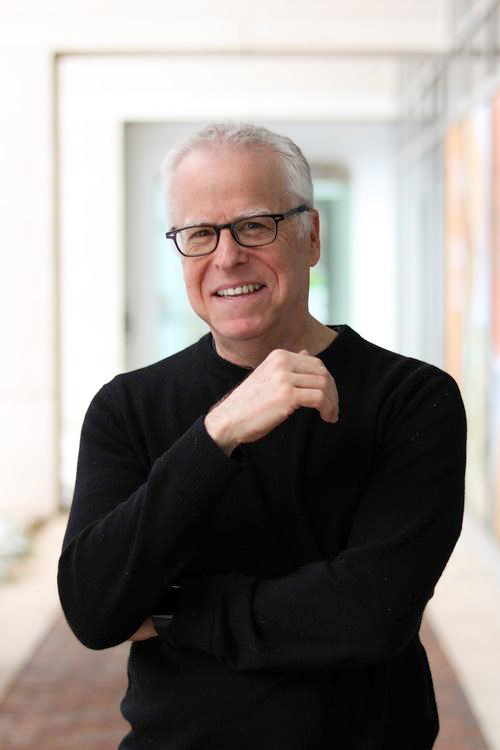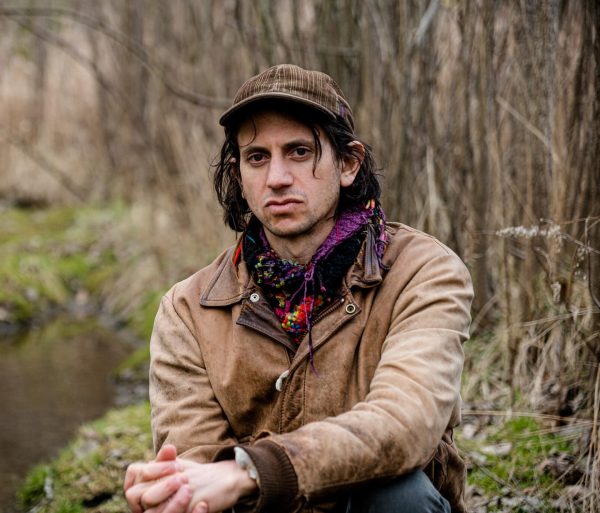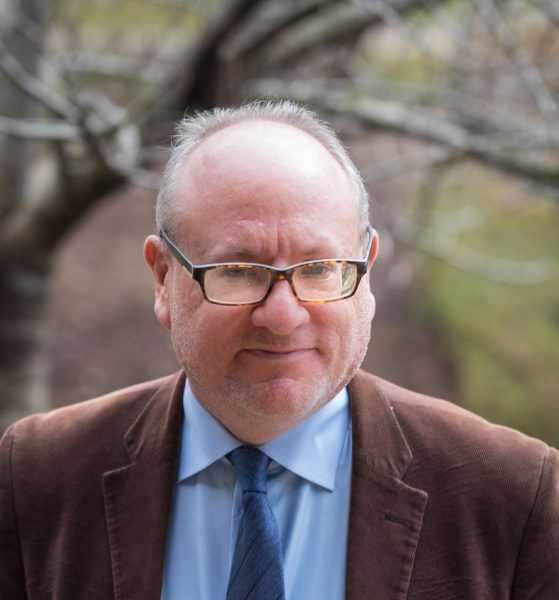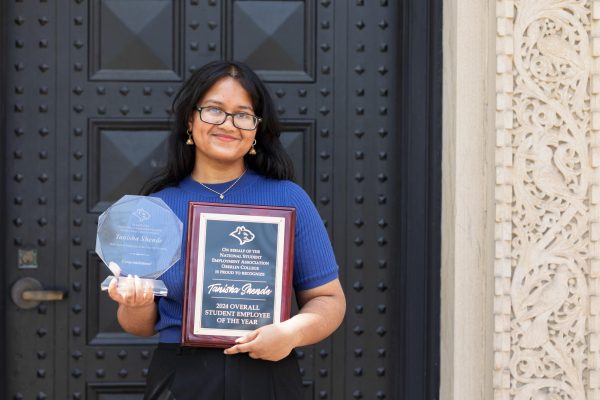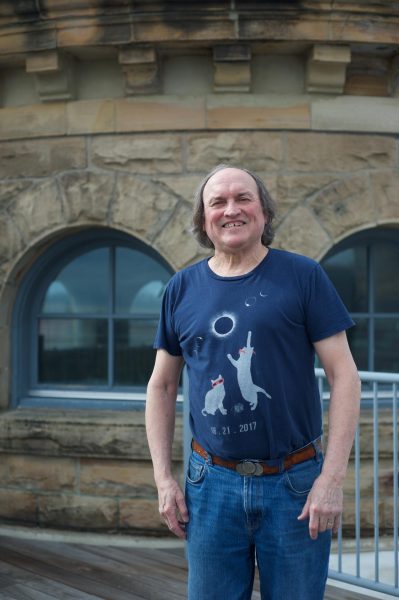OTC: Tom Rosenstiel, OC ’78, Journalist and Fiction Writer
Photo courtesy of Tom Rosenstiel
Tom Rosenstiel
Tom Rosenstiel held a convocation speech titled “Objectivity, Facts, Fiction, and the Future of Journalism” at Oberlin this past Thursday. Rosenstiel is nationally recognized for his work as an author, journalist, researcher, and media critic. He founded the Project for Excellence in Journalism at the Pew Research Center and directed the program for 16 years. He has written seven books on journalism, politics, and ethics, including The Elements of Journalism: What Newspeople Should Know and the Public Should Expect with Bill Kovach, which is widely used in journalism education worldwide. Most recently, he has also delved into the world of fiction and published three novels.
This interview has been edited for length and clarity.
What journalism did you do while at Oberlin, and how did you get into the field after you graduated?
I had been the editor of my high school newspaper, and it had been a big part of my high school life. When I got to Oberlin I thought, “I don’t know if I need to do that again.” I did not spend much of my freshman year doing it. I decided as a sophomore to do some work for the school paper. A woman named Laurie Cohen, who was I think a year ahead of me, got a secret document leaked to her that the administration had secretly decided to depress Black enrollment. Pretty controversial for Oberlin — this was the mid-1970s. Laurie sought me out to help her with the story, and we broke it. It was a major exposé. It made national news and embarrassed the administration significantly, and there were a series of stories that followed.
I realized I was hooked all over again and found myself spending just an enormous amount of time at the paper because of what you were able to learn about the lives of students, the lives of people our age when we were in school. You also meet some great people, like Laurie, who went on to be a reporter at The Wall Street Journal. Then my junior year, I was the editor. And one of the things that you learn working on a school paper is sort of organizational life. How do you motivate people? You’re learning writing, you’re learning reporting, you’re learning how to do all the things you do as a scholar, but you’re doing it sort of in real time.
But you’re also learning about people and motivating them and learning what makes them tick, and learning how people write, learning how to edit, all of those things are just sort of wonderful skills. If you want to write in any capacity, I think you’ll just find the school paper an amazing experience. The alumni of college papers around the country is this sort of dazzling list, many of whom did not practice journalism professionally but benefited enormously from doing it often on their own without academic supervision.
Oberlin is a small campus with an intense media microscope. How can students actively engage in shaping the narrative that goes out about Oberlin?
It’s very hard to change a narrative in real time. It’s like that quote from Martin Luther King that was something like “The long arc of history bends towards justice.” You’re not going to necessarily see that in a year. When you’re 18, 19, 20, 21, or 22, time moves way more slowly for you. You think, “I went to high school for four years, and I changed a lot. Four years is a long time. I’m going to change a lot in four years in college.” And you’re impatient when change doesn’t happen in that kind of timeframe that you’re imagining. When you’re older you realize, “Okay, this narrative about Oberlin actually took many years to set in. It will take many years to change it.”
You can do things to change it as a student, but you may not notice that it’s changed until after you leave. You can be part of that change. You can be part of telling a more accurate story about what the College is. And the way to do that is not just to change the way the story is told, but to change things that happen here. That will eventually change the story that’s told.
One of the things you learn when you’re older is you expect people to be better than they are. You have to sort of take them where they are and then change them. They’re not going to change on their own. So if the media is misrepresenting Oberlin, you need to give the media new things to represent. That happens slowly, but you can do things as a student that will do that.
Some of your work has been in teaching or developing educational programs for new journalists. What inspired you to go down that avenue and what are the most important things you want people to learn?
My friend Bill Kovach, who is from another generation and came of age as a journalist in the late ’50s and early ’60s, said every generation creates its own journalism. When I got into the business, the story was civil rights, and then we had the counterculture of the ’60s. Kovach said that journalism — which was very establishment and a voice of the establishment — had to become more a voice of this counterculture.
And then the journalism that I grew up in — which was after Vietnam and Watergate — it was much more analytical. We were doing long-form journalism. All of those changes were happening at a time when journalism was very rich. So there was a lot of change, none of it really driven by technological disruption that was collapsing the business model or anything radical like we have now.
For journalism to kind of renew itself, it really needs to be better. It needs to be more meaningful in people’s lives. When I came of age in journalism, we were still at a moment where you could be meaningful to people by simply having calendars in the newspaper or weather or the nightly news. … Now journalism has to do much more. … The old metaphor was that journalism was a gatekeeper over what people knew. Now, people know all kinds of things without us, without journalists. The burden of how you create value for them is much higher. I realize, okay, we just can’t do things the way we used to and think that it’s the audience’s failure if they don’t appreciate that.
I also found that you can have much more impact talking to the next generation of journalists than you could to the current. People who were in their teens and early twenties were using technology in new ways. They’re not the next audience for media; they’re the leading edge of the current one. They’re teaching their parents how to do things. So it makes sense that the people who are going to invent the next journalism are in college. When I went to journalism school, really all we were trying to do is learn how to do what our elders did, almost like matching our footprints into the snow. And it was exciting to realize that the future is going to be found by not doing that, by walking a different path.
You’ve made a shift to fiction writing in the last few years. Can talk about why you made that shift?
I decided I wanted to write fiction just because I like to read it and I thought it would be fun to try it. And I was a little bored at work. I was at the Pew Research Center at that point, and I was bored. But I realized that there’s actually something more going on underneath, which was that fiction tells a different kind of truth. It gets at a part of the world that you can’t really get at with journalism. Good fiction is another way of telling the truth, but it tells the truth of the interior of things. How did something feel? Why do people do the things they do? How are they changed by the things that happen to them?
That’s graspable for journalism, but it’s very hard to get at, and it takes a lot of time. You can see it in nonfiction books, you see it in some long-form magazine work, but in day-to-day journalism, not very often. And that’s what fiction’s really good at. The other part of that, I think, is that our public life or political life seems inexplicable to us. How did we get here? How did we find ourselves in this mess? Journalism struggles to explain that, because you almost need to be in the hearts of these people who are barely on speaking terms with each other anymore. I think I’m trying to do that in fiction.
What’s your take on the impeachment and how it’s being covered today?
So one of the enormous challenges for journalists is: How do you cover someone who says you’re the enemy? Someone who, to some extent, denigrates the philosophical underpinnings of what you do? Who is arguing that facts don’t matter, that verification doesn’t — all the things that journalists believe in, the empirical world, he denigrates. That’s a huge, almost existential challenge for journalists. And it’s very easy to fall into the trap of being outraged. I think there is some of that in the coverage. Journalists don’t need to supply the meaning, they don’t need to supply the outrage. The audience will do that for themselves — whether they’re outraged with the Democrats or they’re outraged with the Republicans.
Trump makes that harder because he is so extreme in his reactions to things, almost cartoonish. … The problem, I think, with the coverage is we know how this ends. There’s virtually no scenario by which Trump is convicted by the Senate and removed from office. We need to know the facts of what’s there, but there needs to be some kind of cold eye — about what these facts really mean. What do they add up to? Are they impeachable or not? And some distance about where this ends. The day the whistleblower’s letter was first made public, you could see where this was gonna end up — which is how the House was going to vote to impeach and the Senate was not going to convict. And there’s really nothing that I think has materially changed where we are in that., Yyes, you need to play it out, but I think that the reporting suffers at times from having an underpinning of rooting for where the Democrats are at.
For people who didn’t make it to your talk on Thursday, what’s the one-minute version of the future of journalism?
I’m going to offer six solutions, or six suggestions, which I actually think all can be part of the concentration in Journalism that they’re talking about here at Oberlin. They involve creating what I call a new science of verification and a new science of presentation of journalism. And also rediscovering what I call the original meaning of objectivity, which is much more about method than it is about neutrality. And the last thing I would suggest is, “Keep your cool.” The press needs to keep its cool. Nobody wants to be stopped by a policeman who’s going nuts or walk into an emergency room with a surgeon who is having an emotional breakdown. We need professionals to be professional and dispassionate to do their jobs well, and I think that’s true of journalists too.


